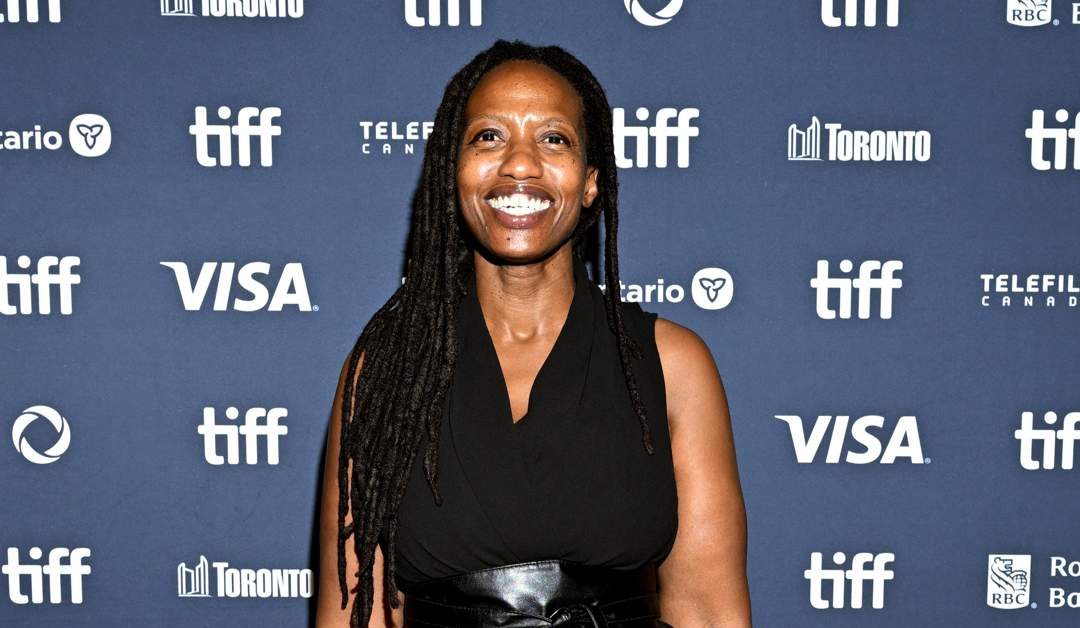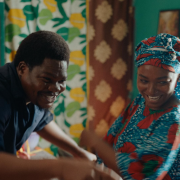“The notion of resistance always having to be loud, glorious, and heroic comes from the fantasies of people who have never actually had to fight for anything. Effective resistance is often quiet, careful, and requires a delicate balance.” – Zamo Mkhwanazi
By Jerry Chiemeke
Drawing from personal history, South African filmmaker, Zamo Mkhwanazi, transforms intimate memories into powerful cinema with her feature debut, Laundry (Uhlanjululo), which premiered at this year’s Toronto International Film Festival (TIFF).
The film emerges from the painful story of Mkhwanazi’s grandfather, whose thriving laundry business in Durban was seized when the apartheid government consolidated its grip on power. This gaping wound becomes the foundation for a quietly devastating portrait of a Black family navigating the precariousness of operating within, but never truly belonging to, the violently stratified world of 1960s South Africa.
Set against the backdrop of apartheid’s tightening noose, Laundry centres on the Sithole family’s laundry business, granted rare permission to operate in a whites-only area of town. Patriarch Enoch (Siyabonga Shibe) walks a careful line between protecting his family’s fragile foothold and contending with his son Khuthala’s (Ntobeko Sishi) dreams of musical stardom.
When Enoch faces imprisonment, the family’s survival depends on choices that pit pragmatic endurance against creative freedom.
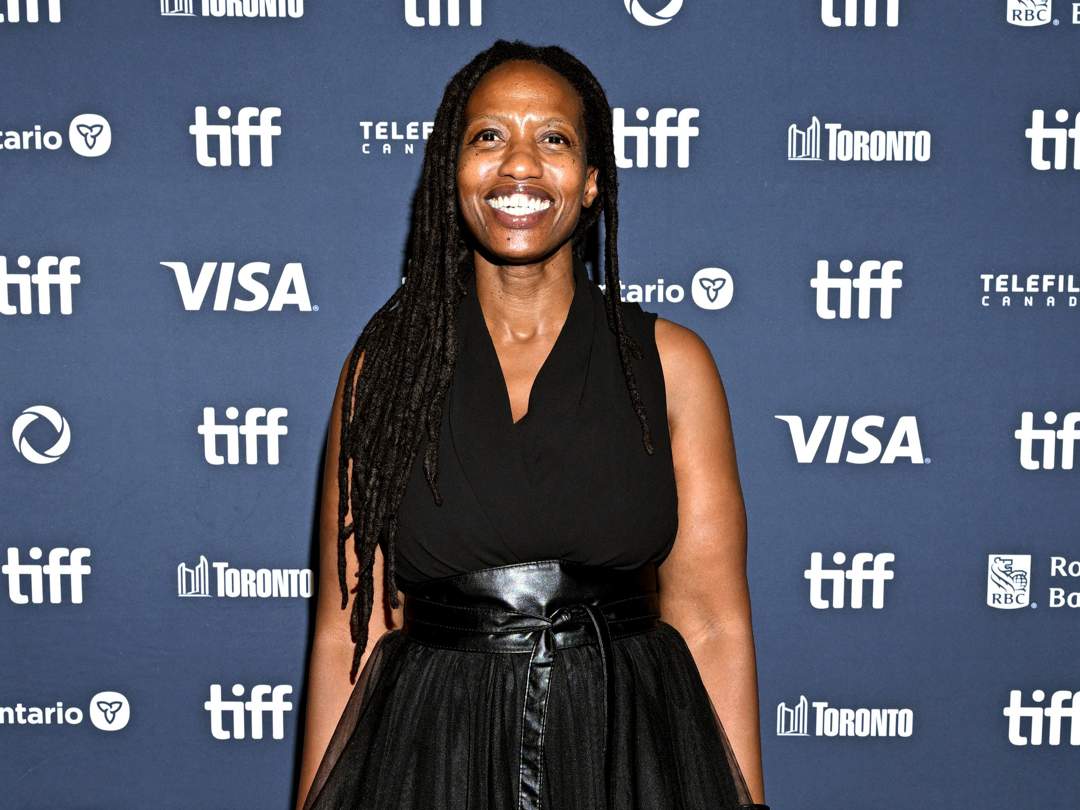
“Prosperous black men like my grandfather were an unwelcome challenge to the myths of white superiority”, says Mkhwanazi. “This film is my way of not being silent. It is the story rarely told in the glorification of the struggle heroes. It is about the smaller moments that take place in the midst of the great injustices”.
Building on her extensive background in South African television and her internationally acclaimed short films, Mkhwanazi brings both intimate knowledge and artistic sophistication to this project. Her approach treats the laundry itself as a character: the steam-filled back rooms reflecting confusion and uncertainty, while the incandescent front space embodies the family’s determination to maintain control.
In an exclusive conversation, Afrocritik caught up with Mkhwanazi during the Festival to discuss stylistic choices, Black joy, the deployment of music in filmmaking, creating story worlds, and the exploration of resistance in African cinema.
Where does this film come from? Describe the combination of ideas and/or real-life experiences that culminated in the birth of Laundry as a screenplay.
My grandfather owned a laundry in Durban, South Africa, and when the apartheid government came into power, the laundry was taken from him.
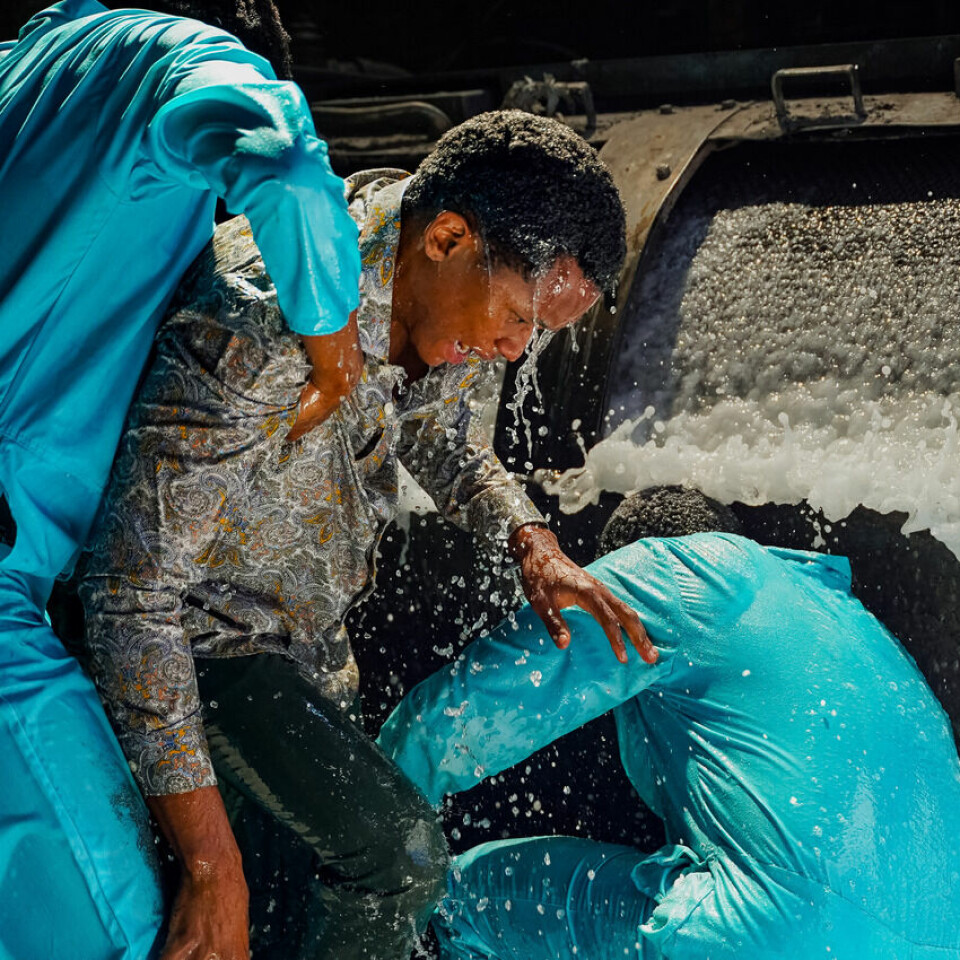
What conversations, if any, did you have with surviving family members about their experiences during Apartheid, and how did those inform the authenticity of this film?
Many. The choices of my mother’s family members were limited after these events, and I made sure to place some of these limitations on the characters in the film. Some of the phrases used by white characters are direct quotes that have been said to my family members.
Music is very important to South Africans, and the stories around how music was made, the places it was played, and the characters that inhabited that world filled out a lot of people for me. The limitations placed on African women that essentially relegated them to the status of children were something my mother navigated directly.
Laundry captures the perennial shadow of oppression that pervaded that era while maintaining moments of joy and hope. How do you navigate showing systemic brutality without letting the film fall into some sort of “joylessness”?
It is surprisingly not difficult for me as a South African. Black rebellion in South Africa has always had an element of the joyful. In the words of Steve Biko, “The most potent weapon in the hands of the oppressor is the mind of the oppressed”.
There is an understanding that not allowing the enemy to hijack your joy is the first weapon we can wield against oppression. If we can find joy in the fight, we can endure it.
From a character perspective, how does Khuthala’s musical ambition function as both personal expression and political act in the context of 1968?
I do not believe anyone wakes up in the morning wishing to fight a system or to fight oppression. What people wake up wanting to do is to fight for their dreams. I chose a commonplace dream. Not particularly admirable like being a doctor, or realistic like running a laundry or noble like being a teacher. Just an ordinary, somewhat selfish, possibly foolish dream.
In the context of a world where black bodies were actively being turned into industrial fodder, a dream that does not create goods and services is the antithesis of a body that is meant to be an input of production.
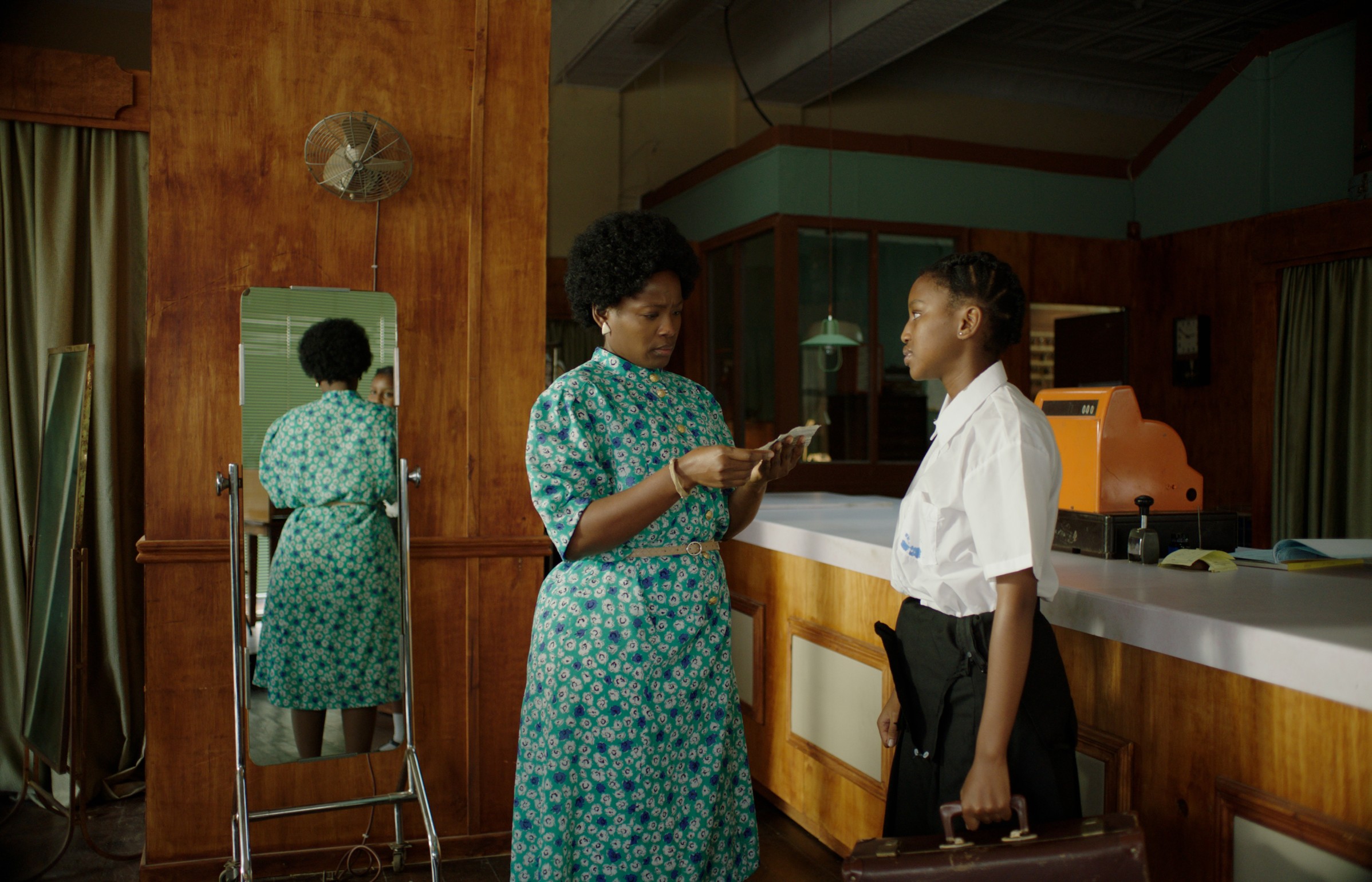
Music serves as both escape and resistance in this film. Can you discuss how you developed the musical elements and what specific South African musicians or musical traditions influenced the soundtrack?
The music was mostly created by Tracy September, Tshepang Ramoba, and Mpumi Mcata who are the musicians seen in the film. They have all been making music for decades and are some of my favourite musicians from my country.
These are musicians who are not afraid to experiment with the traditional to create wholly unique sounds. I did not want the music to sound too ‘familiar’. It needed to have an edge, a feeling that they could have added something significant to the musical cannon of the time.
The film draws parallels to real musicians like Miriam Makeba and Hugh Masekela, who had to flee South Africa. Was there a conscious decision to explore the stories of those who couldn’t escape?
Yes, there are many more who never had a chance to share their talents with the world, who never had a chance to escape the circumstances and the iron fist of a fascist regime.
This feature focuses on the intimate textures of family life rather than grand historical events. What influenced your decision to tell this story through such a domestic lens?
There are more of those ordinary folk who quietly fought the system daily in their lives. Most films are not made by people who have had to survive any kind of oppression. The notion of resistance always having to be loud, glorious, and heroic comes from the fantasies of people who have never actually had to fight for anything. Effective resistance is often quiet, careful, requires a delicate balance, and can even seem illogical.
For example, when you read South African history from the 1980s, you will hear much about the burning of schools – which were indoctrinating black children into willing slavery (called Bantu Education). But you will not hear about the resulting effect because to this day, that history is being told by people who think struggle is only valid when it’s highly visible. Mothers stayed home with their children, who had no classrooms to attend and were in danger of being on those burning streets where apartheid police were shooting us from Israeli-designed tankers.
The government didn’t care about us burning our schools, but they could not continue without the labour of so many black mothers. Stayaways became even more effective as a tool than burning down those schools.
We could be outgunned in the arena of violence; however, staying home and withholding labour was even more crippling for the regime. But I think when we look for drama, we look at the burning of schools and the faces of manufactured heroes shouting slogans. I wanted to look at the home front, where real resistance is held down.
Laundry is a period piece. Tell us more about how the world for this story came to be, from the visual design to the fashion and verbiage.
Production design is what we started with; creating these environments to reflect both the times as well as class and lifestyle differences. This was also a family that owned a laundry and had access to the best seamstresses and fabrics.
The family was not rich, but it was important that they be well turned out, especially compared to a character like Albert, who was a street urchin surviving on the margins. The wardrobe for Lillian was important, as she was the character who linked the world of the father and son.
The actors had much work to do, and we had to place each character within context. Enoch, the father, was a missionary school product who had a strong command of the English language and would pepper his speech more with English, but his wife did not have the same education and was less confident in her speech in general, especially with regard to figures of authority.
His children were already victims of the Bantu Education system and were far more stimulated by their home life, which included a musical, mechanical, and business education. The younger sister retained a certain innocent curiosity about the world, while Khuthala was more single-minded. Therefore, they all spoke a little differently from each other to reflect those historical and personal realities.

How did you work with your actors, particularly Ntobeko Sishi and Siyabonga Shibe, to capture the complex father-son dynamic at the heart of the story?
Both Ntobeko and Siyabonga are fairly experienced actors. I am a fan of stillness in performance as it forefronts emotion over action. With Ntobeko, it sometimes felt unnatural to the character, and so I was selective about using the moments of stillness as a punctuation mark in the story.
Ntobeko was truly a collaborator in creating his character, and sometimes, instead of directing him, I would ask him questions as his character and let him answer with his performance. Siyabonga is an actor with a phenomenal physical presence, and sometimes his stillness could be right down intimidating, which was useful in certain moments with his son.
But it was important to find the warmth of the character while maintaining the stoic dignity required for the storyline. For this, Siyabonga mastered the micro-expressions of the steady Enoch.
The concept of “uneasy privileges” that your characters experience – being granted limited rights within an oppressive system – feels relevant beyond apartheid South Africa. Was this universality intentional?
Oh absolutely. In South Africa, we have the concept of the ‘the better black’, in the USA it is the house negro. Latin America is replete with examples of differential privilege. I am a middle-class person in the most unequal society in the world. These uneasy privileges are very much part of my life. And I am fully aware that as long as these systems of oppression thrive, those privileges are only borrowed.

The laundry business becomes a gathering place for the Black community in the film. How important was it to show these spaces of connection and mutual support within the oppressive system?
The laundry is a place where they are served according to when they arrive, as opposed to most places where whites would always be served first. This is never explicitly mentioned, but is clear in the way customers line up when Enoch is present. It is also important to make it clear that while the area is declared white, most of the people given patronage or working in the area are black.
Apartheid was incredibly nonsensical; a capitalist system that thought it could thrive by keeping the majority of consumers without any buying power. So places like this laundry show that these laws were nigh to impossible to maintain.
After exploring your family’s past so intimately in Laundry, how has this experience changed your approach to storytelling and what stories you want to tell next?
What changed the most for me was when I had the screening here (in Toronto). Honestly, putting the work in front of an audience that connected so strongly with the work assured me that the issues that interest me remain relevant, even as I feel that political storytelling from Africa, particularly stories that challenge white supremacy, are being strongly discouraged both locally and in the international festival space.
Having an audience that responded to the story with enthusiastic appreciation of the difficult themes was a blessing. My next project retains a strongly political point of view, with feminist themes. It’s set in the future and concerns bodily autonomy.
Laundry screened in the Discovery section of TIFF.
Jerry Chiemeke is a Nigerian-born writer, film critic, journalist, and lawyer based in the United Kingdom. His writing has appeared in Die Welt, The I Paper, The Africa Report, The British Blacklist, Berlinale Press, The Johannesburg Review of Books, Culture Custodian, Olongo Africa, and elsewhere. Chiemeke’s work has won or been nominated for the Pushcart Prize, Ken Saro Wiwa Prize, Diana Woods Memorial Award for Creative Nonfiction, Best Small Fictions, and the Quramo Writers Prize. He is the author of the critically-acclaimed short story collection, Dreaming of Ways to Understand You.

